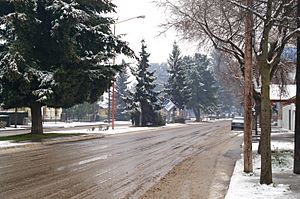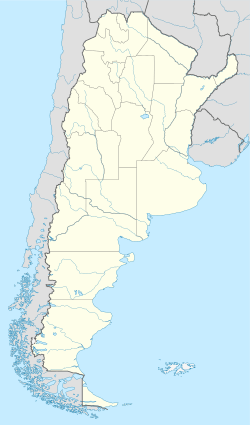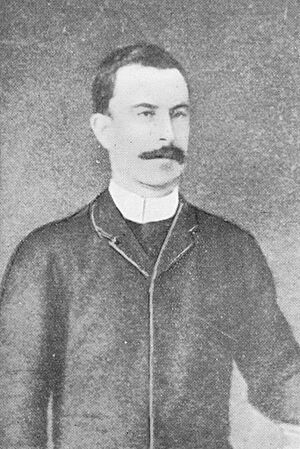Trevelin facts for kids
Quick facts for kids
Trevelin
Trefelin
|
|
|---|---|

A winter day in Trevelin
|
|
| Country | |
| Province | |
| Department | Futaleufú |
| Elevation | 385 m (1,263 ft) |
| Population
(2011)
|
|
| • Total | 9,123 |
| Time zone | UTC−3 (ART) |
| CPA base |
U9203
|
| Dialing code | +54 2945 |
| Climate | Csb |
Trevelin is a town in the western part of Chubut, an Argentine province in Patagonia. Its name comes from the Welsh word Trefelin, which means "mill town".
The town is located on the eastern banks of the Percy River. It is about 22 kilometers (14 miles) south of Esquel. In 2010, about 7,908 people lived there.
Contents
A Look at Trevelin's Past
Trevelin was very important for the Welsh people who came to live in Chubut. The town got its name because the first flour mill was built there in 1891. This mill was called "Los Andes."
A man named John Daniel Evans started the mill. He was famous for exploring the Pampas. He looked for new lands and minerals. People called him 'El Baqueano', which means 'the guide' or 'the scout'.
The Story of Malacara
One interesting place to visit in Trevelin is the grave of Malacara. This was John Evans' horse. In 1884, Malacara saved Evans' life. They were traveling when some local people attacked their group. Malacara bravely escaped down a steep hill. This saved Evans.
Sadly, three other Welshmen with Evans died. They were Richard Davies, John Hughes, and John Parry. They are buried nearby in a place now called 'Dyffryn y Merthyron'. This means 'The Valley of the Martyrs'.
Deciding Argentina's Border
In 1902, there was a disagreement between Argentina and Chile. They were arguing about their border. A special meeting happened in School No.18 in Trevelin. This was on April 30, 1902.
People from the area, including the local Mapuche Tehuelche people and the Welsh settlers, voted. They chose to stay in Argentina. This vote helped decide where the border would be.
The Percy River and Nant Fach Museum
Trevelin is in a beautiful area called the Valley of the 16th of October. In Welsh, this valley is known as Cwm Hyfryd or Bro Hydref. The Percy River flows nearby. This river eventually crosses into Chile.
You can visit a copy of John Evans' old flour mill today. It is at the Nant Fach Museum in Trevelin. The area is called Comarca de los Alerces.
The flour milling business in the area changed a lot after 1949. The government decided that Chubut was not the best place to grow wheat. So, the land was then used for raising cattle instead.
Trevelin's Climate
Trevelin has a mild oceanic climate. This means it has cool summers and mild winters. It also gets most of its rain in the cooler months, like a Mediterranean climate.
The weather here is milder than other places in Patagonia. This is because Trevelin is not very high up. It also gets winds directly from the Pacific Ocean. This special weather helps farming. Even though it can get cold, crops can still grow well.
Temperature and Rain
- The average yearly rainfall is about 632 millimeters (25 inches).
- Most of the rain (about 75%) falls from April to August. These are the cooler months.
- From September to March, it is drier.
- Snow often falls in winter, but it usually does not stay on the ground for a long time.
- Winters can be stormy with rain, sleet, and snow.
- Summers are cool, windy, and quite dry.
The average temperature in Trevelin changes throughout the year.
- In July, the coldest month, the average temperature is about 3.8°C (39°F).
- In January, the warmest month, the average temperature is about 16.1°C (61°F).
- It can get frosty even in summer. This means farmers have to be careful about what they grow.
| Climate data for Trevelin (1970–2009) | |||||||||||||
|---|---|---|---|---|---|---|---|---|---|---|---|---|---|
| Month | Jan | Feb | Mar | Apr | May | Jun | Jul | Aug | Sep | Oct | Nov | Dec | Year |
| Record high °C (°F) | 37 (99) |
38 (100) |
35 (95) |
27 (81) |
22 (72) |
18 (64) |
20 (68) |
21 (70) |
25 (77) |
29 (84) |
33 (91) |
36 (97) |
38 (100) |
| Mean daily maximum °C (°F) | 24 (75) |
24 (75) |
21 (70) |
16 (61) |
11 (52) |
8 (46) |
7 (45) |
10 (50) |
14 (57) |
17 (63) |
20 (68) |
22 (72) |
16 (61) |
| Daily mean °C (°F) | 16 (61) |
16 (61) |
13 (55) |
9 (48) |
6 (43) |
4 (39) |
3 (37) |
5 (41) |
8 (46) |
10 (50) |
12 (54) |
14 (57) |
10 (50) |
| Mean daily minimum °C (°F) | 8 (46) |
8 (46) |
5 (41) |
3 (37) |
1 (34) |
0 (32) |
−1 (30) |
0 (32) |
1 (34) |
3 (37) |
5 (41) |
7 (45) |
3 (37) |
| Record low °C (°F) | −2 (28) |
−2 (28) |
−4 (25) |
−7 (19) |
−13 (9) |
−13 (9) |
−15 (5) |
−13 (9) |
−9 (16) |
−9 (16) |
−5 (23) |
−3 (27) |
−15 (5) |
| Average precipitation mm (inches) | 47 (1.9) |
35 (1.4) |
55 (2.2) |
81 (3.2) |
156 (6.1) |
155 (6.1) |
150 (5.9) |
121 (4.8) |
72 (2.8) |
61 (2.4) |
54 (2.1) |
45 (1.8) |
1,032 (40.6) |
| Average relative humidity (%) | 64 | 58 | 60 | 65 | 76 | 79 | 77 | 71 | 64 | 61 | 57 | 58 | 66 |
| Source: Instituto Nacional de Tecnología Agropecuaria | |||||||||||||
See also
 In Spanish: Trevelin para niños
In Spanish: Trevelin para niños
 | John T. Biggers |
 | Thomas Blackshear |
 | Mark Bradford |
 | Beverly Buchanan |



